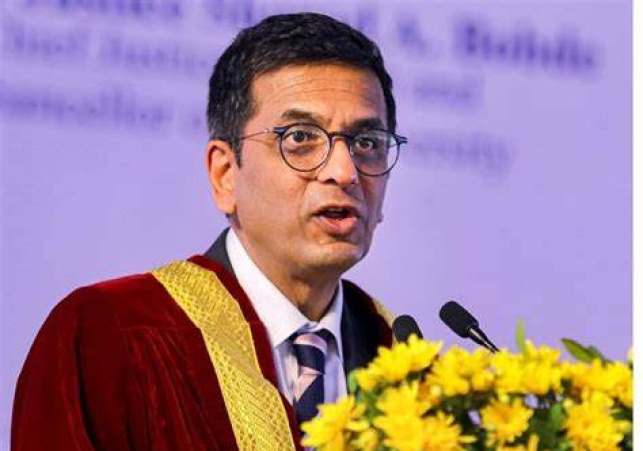
Calls for Enhanced Access to Justice Made by CJI
Chief Justice of India Calls for Enhanced Access to Justice
Barriers to Justice Must be Eliminated
Chief Justice of India D Y Chandrachud, highlighted the pressing challenge before the Indian judiciary - to remove barriers to accessing justice. He stressed that the effectiveness of courts lies in their ability to fulfill their constitutional duty. Speaking at the Independence Day celebrations organized by the Supreme Court Bar Association (SCBA), he underscored the importance of procedural and substantive access to justice and the need to instill confidence in the court's ability to deliver justice to all citizens.
Also Read: Punjab's goal: drug-free by next Independence Day, says CM Mann (arthparkash.com)
The CJI also emphasized the necessity of revamping court infrastructure to ensure accessibility and inclusivity. He mentioned that the primary task is to modernize judicial facilities, enabling the judiciary to cater to future challenges. He revealed plans to expand the Supreme Court and detailed the comprehensive approach, which involves constructing a new building to accommodate additional courts, judges' chambers, and other necessary amenities.
Phased Approach for Modernization
Chief Justice Chandrachud outlined the phased execution of the expansion plan. In the first phase, a new building will replace the museum and annexe building, housing various courtrooms, chambers, and essential facilities. The subsequent phase will see the construction of a second building within the existing court complex. The new structures are aimed at not only meeting practical requirements but also embodying the principles and aspirations of the Indian Constitution.
Recognizing the potential of technology, the CJI emphasized its role in eliminating inefficiencies and opacity from judicial processes. Referring to technology as a tool to overcome procedural barriers to justice, he highlighted the ongoing implementation of the third phase of the e-courts project. Chief Justice Chandrachud believes that technology's transformative power will enhance transparency and streamline legal proceedings.
Judiciary's Role in Society
Reflecting on the judiciary's evolution post-independence, the CJI acknowledged the transformation from colonial legal traditions to a system responsive to human interests and societal needs. He emphasized that the judiciary's aim is to manage public expectations and establish itself as an independent and impartial institution. In this pursuit, he urged judges and lawyers to conduct themselves in a manner that bolsters public confidence in the integrity of the legal process.
In his address, Chief Justice Chandrachud also announced the imminent release of a handbook on combating gender stereotypes in judicial decision-making. This initiative underscores the judiciary's commitment to introspection, questioning biases, and ensuring that judicial institutions remain unbiased and equitable.
The CJI concluded by emphasizing that the legitimacy of institutions is cemented when the courts function as robust, independent entities uninfluenced by the litigant's identity. He urged judges and legal professionals to embody and uphold the principles of independence and integrity, ensuring that justice remains accessible, impartial, and serves the interests of all citizens.
Also Read: Massive Tree Removal Sparks Environmental Concerns (arthparkash.com)





